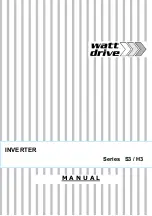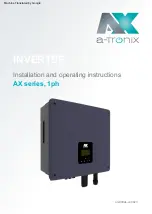
Traverse function
The traverse function, used for the
traverse axis of spinning machine,
prevents uneven winding or collapsing.
Increased excitation
deceleration
The deceleration time can be reduced
without using a brake resistor.
The tact time can be reduced for a
transfer line or the like.
Optimum excitation control
This control enables the motor efficiency to
its optimum. More energy saving is possible
in applications with variable load torque
characteristic such as fan and pump.
PID control
Flow rate and air volume is controlled
by an inverter. It is possible to
regulate flow rate and air volume so
that they stay at a pre-set level.
Adjustable 3 points V/F
The optimal V/F pattern matching the
torque characteristics of the facility
can be set.
Communication operation
(RS-485 communication)
Conveyor belts can be controlled
individually by using multiple inverters.
Automatic operation is possible by
collectively managing multiple inverters.
S-pattern
acceleration/deceleration
An S-pattern is maintained from the
present frequency to the target frequency;
therefore it is possible to reduce shock
during acceleration/deceleration and
prevent load shifts.
Power failure time
decelerationto-stop function
The motor decelerates to a stop without
coasting when power failure or undervolt-
age occurs. Slack in the thread can be
controlled even if there is a power failure.
Continuous operation function
at instantaneous power failure
Even in the event of an instantaneous
power failure, motor operation
continues without coasting and
production is maintained.
f0: set frequency
f1: amplitude amount from the set frequency
f2: compensation amount at transition from
acceleration to deceleration
f3: compensation amount at transition from
deceleration to acceleration
t1: time for acceleration during traverse operation
t2: time for deceleration during traverse operation
Variety of Functions to
Support Various Applications
Spinning
Conveyor
Fan and pump
General-purpose magnetic
flux vector control
Brake unit connection
A variety of fountain displays are possible by
connecting a brake unit which allows high
starting torque and improved braking
efficiency during deceleration under
General-purpose magnetic flux vector control.
Multi-speed function (Up to
15-speed switching operation)
Operation speeds can be pre-set via parameters.
Motor speed to meet the height requirements of
the fountain can be set and easily changed.
Continuous operation function
at instantaneous power failure
Even in the event of an instantaneous power
failure, motor operation continues without coasting
and the fountain's operations are undisturbed.
Continuous operation function
at instantaneous power failure
Even in the event of an instantaneous
power failure, motor operation
continues without coasting and
production is maintained.
Power failure time
decelerationto-stop function
The motor decelerates to a stop without
coasting when power failure or undervoltage
occurs. This function is useful for stopping
the motor at power failure to prevent danger.
Multi-speed function (Up to
15-speed switching operation)
Operation speeds can be pre-set via
parameters. Operation speed suitable
for the ingredients being used can be
set and easily changed.
General-purpose magnetic
flux vector control
Depending on the type of ingredients,
with the right amount of low speed
torque it is possible to regulate a
suitable speed for food production.
Power failure time
decelerationto-stop function
The motor decelerates to a stop without
coasting when power failure or undervoltage
occurs. This function is useful for stopping
the motor at power failure to prevent danger.
Fast-response current limit
Operation continues and the overcur-
rent alarm is not activated even if
there is a sudden change in load
during the cutting of food.
Fountain
Wood processing machine
Food machinery
Power supply
Motor
decelerated
to a stop
Motor
rotations
per minute
Output
frequency
Motor load torque (%)
Mo
tor
e
ffi
cien
cy
(%
)
[Comparison of Mitsubishi products]
f0
Output frequency (Hz)
Time (s)
f1
f1
t1
f2
f3
STF (STR)
signal
X37 signal
ON
ON
Traverse operation
t2
Time
Output frequency
(Hz)
0
20
20
40
40
60
60
80
80
100
100
Optimum excitation control
More energy saving
V/F control
Time
RH signal
RM signal
RL signal
Speed 1
(High speed)
Speed 2
(Middle speed)
Speed 3
(Low speed)
Output fr
equency (Hz)
IPF
Power
supply
Output
frequency
Y46 signal
During deceleration
at occurrence of
power failure
Reacceleration *
Time
When power is restored during deceleration
at occurrence of power failure
* Acceleration time depends on Pr.7 (Pr.44 ).
1
1
Features
Features
Features
Features
8
Summary of Contents for FREQROL-CS80
Page 1: ...COMPACT SMART INVERTER FREQROL CS80 FACTORY AUTOMATION ...
Page 36: ...36 ...
Page 37: ...37 ...









































